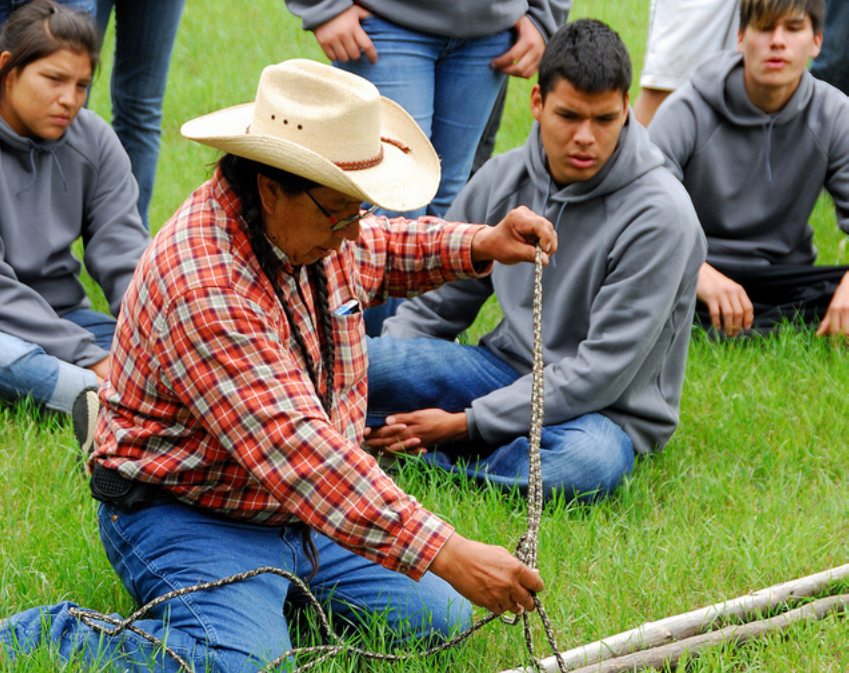Demographic Datapedia Entry:
Indigenous, First Nations,
Métis, and Inuit
In this entry for Indigenous, First Nations, Métis, and Inuit demographics, we are intentionally holding space for co-creating this content in partnership with Indigenous, First Nations, Métis, and Inuit peoples from across Alberta and potentially, Canada more broadly. The importance of this collaboration lies in the intent to oppose the deep history of research malpractice relating to these communities1, 2, 3 and to produce research that is made more productive and accurate from this close collaboration.4


Creating the content for this entry, and capturing considerations for other demographic variables in the demographic datapedia, in partnership will recognize and intentionally prioritize indigenous world views and ways of knowing in an area that has essentially been constructed in a colonial worldview2. This approach will apply a decolonizing lens to our work, which is vital for resisting this history of colonial practices in research2.
Furthermore, the partnership with Indigenous, First Nations, Métis, and Inuit people will provide a tool to “counter settler colonialism and enact self-determination”5. This work is vital to recognizing the rights of Indigenous people and is in keeping with the spirit of the Truth and Reconciliation Commission.
Finally, we will strive to carry out this work according to the OCAP© and CARE principles of data sovereignty and governance along with the principles set forth by Inuit6 and Métis7 communities. The principles of OCAP© seek to reverse the historical mistreatment, disempowerment, and misrepresentation of Indigenous, First Nations, Métis, and Inuit communities by ensuring those communities have control over the research process1. Given the “unambiguous relationship between control and benefit” 3, thoughtful engagement and co-creation of content with these communities will ensure that they benefit from our work as well. Further benefits will accrue under the conditions of the CARE principles, which recommend that data ecosystems support the use and reuse of data by Indigenous communities and create data that reflects their communities’ values8 .
We recognize that this work cannot be rushed and that many voices will need to be heard. Please keep checking back to learn more about how our journey unfolds in this area.
If you are interested in learning more about, or participating in this work in the future, please contact us at info@policywise.nickpetlock.com.
Footnotes
Bruhn, J. (2014). Identifying useful approaches to the governance of Indigenous data. The Governance of Indigenous Information, 5(2), 1-32. DOI:10.18584/iipj.2014.5.2.5
Kovach, M. (2009). Indigenous methodologies: Characteristics, conversations, and contexts. University of Toronto Press.
Schnarch, B. (2004). Ownership, Control, Access, and Possession (OCAP) or self-determination applied to research: A critical analysis of contemporary First Nations research and some options for First Nations communities. Journal of Aboriginal Health, 1(1), 1-37. https://ruor.uottawa.ca/bitstream/10393/30539/1/OCAP_Critical_Analysis_2005.pdf
Feir, D. & Hancock, R.L.A. (2016). Answering the call: A guide to reconciliation for quantitative social scientists. Canadian Public Policy, 42(3), 350-365. https://www.jstor.org/stable/10.2307/canapublpolianal.42.3.350
McMahon, R., LaHache, T., & Whiteduck, T. (2015). Digital data management as Indigenous resurgence in Kahnawà:ke. The International Indigenous Policy Journal, 6(3), 1-19. DOI:10.18584/iipj.2015.6.3.6
Inuit Tapiriit Kanatami. (2018). National Inuit strategy on research. https://www.itk.ca/wp-content/uploads/2018/04/ITK_NISR-Report_English_low_res.pdf
National Aboriginal Health Organization. (n.d.). Principles of ethical Métis research. https://achh.ca/wp-content/uploads/2018/07/Guide_Ethics_NAHOMetisCentre.pdf
Caroll, S.R., Garba, I., Figueroa-Rodríguez, O.L., Holbrook, J., Lovett, R. Materechera, S., Parsons, M., Raseroka, K., Rodriguez-Lonebear, D., Rowe, R., Sara, R., Walker, J.D., Anderson, J., & Hudson, M. (2020). The CARE principles for Indigenous data governance. Data Science Journal, 19(1), 1-12. http://doi.org/10.5334/dsj-2020-043
Do you have additions to suggest to the Datapedia? Or, do you want to learn more about working with data?
We’d love to hear from you. Contact us at info@policywise.nickpetlock.com.

